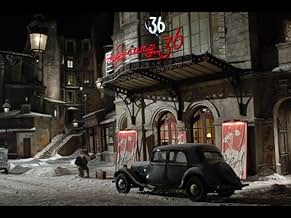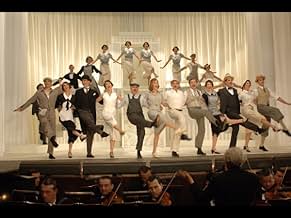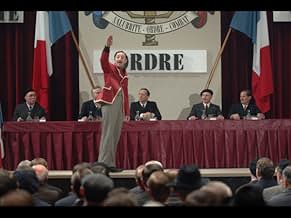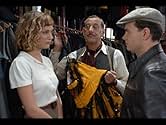IMDb-BEWERTUNG
6,5/10
2998
IHRE BEWERTUNG
Füge eine Handlung in deiner Sprache hinzuWhen Chansonia, a nightclub, is shut down by the landlord, the stage manager Pigoil is forced to look for a new job. He finds hope when he discovers a young woman with a lovely singing voice... Alles lesenWhen Chansonia, a nightclub, is shut down by the landlord, the stage manager Pigoil is forced to look for a new job. He finds hope when he discovers a young woman with a lovely singing voice.When Chansonia, a nightclub, is shut down by the landlord, the stage manager Pigoil is forced to look for a new job. He finds hope when he discovers a young woman with a lovely singing voice.
- Für 1 Oscar nominiert
- 3 Gewinne & 7 Nominierungen insgesamt
Empfohlene Bewertungen
I may have seen one of the last musical hall revivals in London a few years ago on The Strand—it was full of tinny song and dance that made you tap your feet and long for the good old days of vaudeville and innocence. The telly has pretty much killed that simple pleasure, but Paris 36, a melodramatic story of the revival of a Chansonia in northern Paris, 1936, revives the joy of ensemble acting and dancing, original music, and the intrigue so much a part of the lively arts when they become business and pleasure.
Three Parisians undertake saving a music hall in their section of Paris called Faubourg using the talents of a star-crossed couple supplying the on and off stage romance. The intrigue is much less than Cabaret's; the nostalgia is more than Cinema Paradiso's; it's all more Moulin Rouge than Amelie. The songs are fetching, made especially for the film, and the plot is pure cliché right down to the lecherous businessman and cute ingénue.
The background is unmistakably fascist versus socialist, owners battling workers for a depression-era slim slice of the economic pie and soul. Paris 36 risks it all with formulaic intrigue and predictable denouement. Yet throughout is a good cheer, a bel canto breeziness that draws you in to song, dance, history, and politics, never too heavy, light enough to make you wish that music hall still stood on The Strand.
Three Parisians undertake saving a music hall in their section of Paris called Faubourg using the talents of a star-crossed couple supplying the on and off stage romance. The intrigue is much less than Cabaret's; the nostalgia is more than Cinema Paradiso's; it's all more Moulin Rouge than Amelie. The songs are fetching, made especially for the film, and the plot is pure cliché right down to the lecherous businessman and cute ingénue.
The background is unmistakably fascist versus socialist, owners battling workers for a depression-era slim slice of the economic pie and soul. Paris 36 risks it all with formulaic intrigue and predictable denouement. Yet throughout is a good cheer, a bel canto breeziness that draws you in to song, dance, history, and politics, never too heavy, light enough to make you wish that music hall still stood on The Strand.
It's difficult to explain this film's charm, but suffice it to say that if you love Paris and films about it, this portrayal of the city in 1936 will sweep you off your feet. At two hours long and in French, the movie may seem off-putting at first, but go with the flow and savor the fine direction, cinematography, sets, and the original music by Christophe Barratier. The story takes place in and around a Paris music hall, the proprietor of which has been charged with murder; during his confession we learn the story of the music hall in flashback performances. Even the kindest critics dismissed the film as what one called "a gleaming hunk of French period schmaltz." Exactly what I liked about it.
This movie was a surprising little gem. I knew nothing about it and went with some friends yesterday on a whim. It was beautifully photographed and the rendition of 1936 Paris seemed quite authentic. The costumes were exquisite, the story is engaging, and of all the characters were genuine. The scenes in the theater left me smelling the greasepaint
I think this movie captured me because I was once heavily involved in local, amateur theater where we knocked ourselves out putting on shows just for the fun of it. I could identify with these characters struggling to eke out a living and dreaming of fame and success. The contrast of such joyous activities and the hopes of Pigoil, Douce and Jacky, amongst others against those dark times in Europe gives this movie a wonderful, entertaining balance.
It is well worth seeing.
I think this movie captured me because I was once heavily involved in local, amateur theater where we knocked ourselves out putting on shows just for the fun of it. I could identify with these characters struggling to eke out a living and dreaming of fame and success. The contrast of such joyous activities and the hopes of Pigoil, Douce and Jacky, amongst others against those dark times in Europe gives this movie a wonderful, entertaining balance.
It is well worth seeing.
This is not a great film, a masterpiece of cinema-as-art. It is, however, a wonderful movie that will delight you while you watch it and leave you with many happy musical memories after it has finished.
Though the director and star are the same, this movie does not resemble Les Choristes. It is, instead, an homage to French popular music of the 1930s (and 1940s). If you don't know that music and the stars who made it famous, you'll miss the many references. The movie will still be enjoyable, but it won't evoke the memories (and pleasures) that it would to French viewers over 60.
The music, most of it original, nevertheless comes very close to pastiche of popular numbers from that era. (One repeated number is very close to Messager's "Clou clou," which I think is from his Véronique.) The performances and characters also allude to stars of the past, though not necessarily in a one-on-one way. There is the music hall singer Tony Rossignol, whose light lyric tenor recalls Tino Rossi, though his Spanish get-up and music recalls Luis Mariano. Kad Merad's character starts out doing terrible impressions, of animals and Fernandel. He finally has a hit when he starts singing like Charles Trenet. Even though the music is pastiche, it is sometimes very catchy, and very much caught me up.
One of the previous reviewers said that Clovis Cornilliac was made up as Jean Gabin but couldn't reproduce the latter's charisma. I hope he was not meant to recall Gabin, because he certainly doesn't. He's pleasant in his role, as is the female lead, but the star is definitely Gerard Jugniot, who gives yet another first-rate performance.
This won't make the viewing list for any course on French cinema, nor should it. But you'll definitely enjoy it.
P.S. I watched this movie again, about a year after my first viewing of it. While I still found it enjoyable, I realize, in rereading my review, that it was the last part, with all the music, that made the strong impression on me. One of the reviews written since my first one notes that the movie might have been more memorable if there had been more music spread throughout it, and I agree. The show the company originally stages is bad vaudeville, and bad vaudeville numbers have only limited appeal. The subplot concerning Galapiat and the French fascists is somehow disconnected from the rest. Having subsequently seen that same actor, Bernard-Pierre Donnadieu, in L'affaire Salengro, where he played someone on the other side of that fight, I realize how much better the issue could have been presented.
The film is definitely worth watching, and should please most viewers. Gérard Jugnot gives yet another very fine, very moving performance. I don't know how well it will repay repeated viewings, however. I don't know if I would want to watch it myself a third time.
Though the director and star are the same, this movie does not resemble Les Choristes. It is, instead, an homage to French popular music of the 1930s (and 1940s). If you don't know that music and the stars who made it famous, you'll miss the many references. The movie will still be enjoyable, but it won't evoke the memories (and pleasures) that it would to French viewers over 60.
The music, most of it original, nevertheless comes very close to pastiche of popular numbers from that era. (One repeated number is very close to Messager's "Clou clou," which I think is from his Véronique.) The performances and characters also allude to stars of the past, though not necessarily in a one-on-one way. There is the music hall singer Tony Rossignol, whose light lyric tenor recalls Tino Rossi, though his Spanish get-up and music recalls Luis Mariano. Kad Merad's character starts out doing terrible impressions, of animals and Fernandel. He finally has a hit when he starts singing like Charles Trenet. Even though the music is pastiche, it is sometimes very catchy, and very much caught me up.
One of the previous reviewers said that Clovis Cornilliac was made up as Jean Gabin but couldn't reproduce the latter's charisma. I hope he was not meant to recall Gabin, because he certainly doesn't. He's pleasant in his role, as is the female lead, but the star is definitely Gerard Jugniot, who gives yet another first-rate performance.
This won't make the viewing list for any course on French cinema, nor should it. But you'll definitely enjoy it.
P.S. I watched this movie again, about a year after my first viewing of it. While I still found it enjoyable, I realize, in rereading my review, that it was the last part, with all the music, that made the strong impression on me. One of the reviews written since my first one notes that the movie might have been more memorable if there had been more music spread throughout it, and I agree. The show the company originally stages is bad vaudeville, and bad vaudeville numbers have only limited appeal. The subplot concerning Galapiat and the French fascists is somehow disconnected from the rest. Having subsequently seen that same actor, Bernard-Pierre Donnadieu, in L'affaire Salengro, where he played someone on the other side of that fight, I realize how much better the issue could have been presented.
The film is definitely worth watching, and should please most viewers. Gérard Jugnot gives yet another very fine, very moving performance. I don't know how well it will repay repeated viewings, however. I don't know if I would want to watch it myself a third time.
Pigoil (Gerard Jugnot) runs a small vaudeville like theater, the Chansonia, in the Faubourg section of Paris. His wife is a "star" of the theater and the rest of the performers are a tight-knit group. Perhaps, too close, for Pigoil is given a double whammy one day. First, his wife has been sleeping with not one, but, two of the other troupe members and, even more sadly, the owner of the building can not pay his debts (it is the depression everywhere) and commits suicide. Soon, Pigoil and his young, idolized son Jojo are barely scraping by. But, then, Pigoil makes a deal with the Fascist like gentleman who truly runs the neighborhood. Can his show group have one month to make the theater profitable again? The ruthless man agrees to give them a chance, for he has his eye on one of their newest performers, a beautiful young singer named Douce. Will the Chansonia become successful once more? This is an unusual look at life in the depression, for it has a French setting, where fascism was brewing in neighboring Germany and in France. There are many subplots to the main one, including one of an agoraphobic music teacher, residing across from the Chansonia, who was once a leading song writer and who has an unlikely connection to Douce. Needless to say, the recreation of the former theater district is very fine, as are the costumes, the cast, the story, and the direction. Therefore, if you like foreign films and unusual tales, put this on your list for future viewing. It is a fine example of quality French cinematic achievements.
Wusstest du schon
- WissenswertesFaubourg is not French for "the district." It is a contraction of "faux bourg", French for "false town" and were used to designate smaller towns attached to larger towns or cities. A lot of these faubourgs were independent cities until they were attached to Paris and lost all independence around during the 17th and 18th century. A new outer wall was later erected around the city. These faubourgs, especially those on the East side, were usually blue collar, with a very active night life.
- PatzerWhen Jacky accidentally turns on the radio while Pigoil is talking to his wife and her new lover, the radio is very loud immediately after Jacky flips the switch. On this type of old tube amplified radio, it would take several seconds for the tubes to heat up and amplify any signal, and the volume would go up very slowly.
- VerbindungenFeatured in The 82nd Annual Academy Awards (2010)
Top-Auswahl
Melde dich zum Bewerten an und greife auf die Watchlist für personalisierte Empfehlungen zu.
- How long is Paris 36?Powered by Alexa
Details
- Erscheinungsdatum
- Herkunftsländer
- Offizielle Standorte
- Sprache
- Auch bekannt als
- Paris 36
- Drehorte
- Surtainville, Manche, Frankreich(beach scenes by the end)
- Produktionsfirmen
- Weitere beteiligte Unternehmen bei IMDbPro anzeigen
Box Office
- Bruttoertrag in den USA und Kanada
- 851.540 $
- Eröffnungswochenende in den USA und in Kanada
- 44.690 $
- 5. Apr. 2009
- Weltweiter Bruttoertrag
- 12.940.622 $
- Laufzeit2 Stunden
- Farbe
- Sound-Mix
- Seitenverhältnis
- 2.35 : 1
Zu dieser Seite beitragen
Bearbeitung vorschlagen oder fehlenden Inhalt hinzufügen

Oberste Lücke
By what name was Paris, Paris - Monsieur Pigoil auf dem Weg zum Glück (2008) officially released in India in English?
Antwort

































